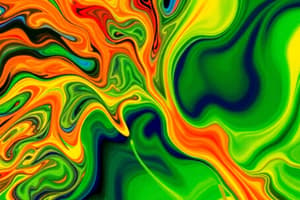Podcast
Questions and Answers
What happens to the entropy of a system as it approaches absolute zero?
What happens to the entropy of a system as it approaches absolute zero?
- It increases indefinitely.
- It approaches a minimum value. (correct)
- It remains constant.
- It becomes chaotic.
At absolute zero, the thermal motion of particles ceases entirely.
At absolute zero, the thermal motion of particles ceases entirely.
True (A)
What is the formula for Gibbs free energy?
What is the formula for Gibbs free energy?
∆G = ∆H - T∆S
Superconductivity shows zero electrical resistance when certain materials are cooled to very low ______.
Superconductivity shows zero electrical resistance when certain materials are cooled to very low ______.
Match the following terms with their definitions:
Match the following terms with their definitions:
What does the First Law of Thermodynamics state?
What does the First Law of Thermodynamics state?
Thermochemistry focuses exclusively on the physical changes in substances.
Thermochemistry focuses exclusively on the physical changes in substances.
What is the symbol for change in internal energy?
What is the symbol for change in internal energy?
In thermochemistry, a negative ΔH value indicates a[n] ______ reaction.
In thermochemistry, a negative ΔH value indicates a[n] ______ reaction.
Which of the following statements best describes entropy in the context of thermodynamics?
Which of the following statements best describes entropy in the context of thermodynamics?
Provide an example of an endothermic reaction.
Provide an example of an endothermic reaction.
The process of perfume diffusion demonstrates a decrease in entropy.
The process of perfume diffusion demonstrates a decrease in entropy.
Flashcards
First Law of Thermodynamics
First Law of Thermodynamics
Energy cannot be created or destroyed, only transferred or converted.
Internal Energy (ΔU)
Internal Energy (ΔU)
Change in the total energy in a system.
Thermochemistry
Thermochemistry
The study of heat changes in chemical reactions.
Enthalpy (ΔH)
Enthalpy (ΔH)
Signup and view all the flashcards
Exothermic Reaction
Exothermic Reaction
Signup and view all the flashcards
Endothermic Reaction
Endothermic Reaction
Signup and view all the flashcards
Entropy
Entropy
Signup and view all the flashcards
Thermodynamic Law
Thermodynamic Law
Signup and view all the flashcards
Third Law of Thermodynamics
Third Law of Thermodynamics
Signup and view all the flashcards
Superconductivity
Superconductivity
Signup and view all the flashcards
Gibbs Free Energy
Gibbs Free Energy
Signup and view all the flashcards
Enthalpy Change (ΔH)
Enthalpy Change (ΔH)
Signup and view all the flashcards
Entropy (ΔS)
Entropy (ΔS)
Signup and view all the flashcards
Study Notes
Thermodynamics
- Thermodynamics is the study of relationships between heat, work, energy, and matter.
- It's crucial for understanding how energy transforms and matter behaves macroscopically.
First Law of Thermodynamics
- Energy cannot be created or destroyed, only transferred or converted.
- Expressed as ∆U = Q - W, where ∆U is internal energy change, Q is heat, and W is work.
- This law embodies the principle of energy conservation.
Thermochemistry
- Deals with heat changes during chemical reactions.
- Enthalpy (ΔH) is central, representing heat exchanged at constant pressure.
- Thermochemical equations calculate ΔH, aiding in understanding reaction energetics.
- These equations include the energy absorbed or released during a reaction.
Examples of Thermochemical Equations
- Combustion of methane: CH₄(g) + 2O₂(g) → CO₂(g) + 2H₂O(l) ΔH = -890.3 kJ
- Formation of water: H₂(g) + ½O₂(g) → H₂O(l) ΔH = -285.8 kJ
- Melting of ice: H₂O(s) → H₂O(l) ΔH = +6.00 kJ
- Positive ΔH = Endothermic reaction
- Negative ΔH = Exothermic reaction
Second Law of Thermodynamics
- Illustrated by perfume diffusion: perfume molecules spontaneously spread throughout a room.
- Also illustrated by melting ice: initially ordered ice and water molecules become mixed.
- These processes increase entropy (disorder).
Third Law of Thermodynamics
- Entropy of a system approaches a constant value as temperature approaches absolute zero.
- Absolute zero is the point where molecular motion ceases.
- At absolute zero, entropy approaches a minimum value (typically zero)
- Entropy measures disorder or randomness in a system.
Third Law Applications
- Superconductivity: certain materials exhibit zero electrical resistance at very low temperatures (e.g., MRI machines, efficient power transmission).
Gibbs Free Energy
- Gibbs free energy (G) and Helmholtz free energy (A) describe a system's ability to do work at constant temperature and pressure.
- ΔG = ΔH - TΔS, where ΔG is change in Gibbs free energy, ΔH is enthalpy change, T is temperature in Kelvin, and ΔS is entropy change.
- ΔG<0 means spontaneous reaction
- ΔG>0 means non-spontaneous reaction
Studying That Suits You
Use AI to generate personalized quizzes and flashcards to suit your learning preferences.




